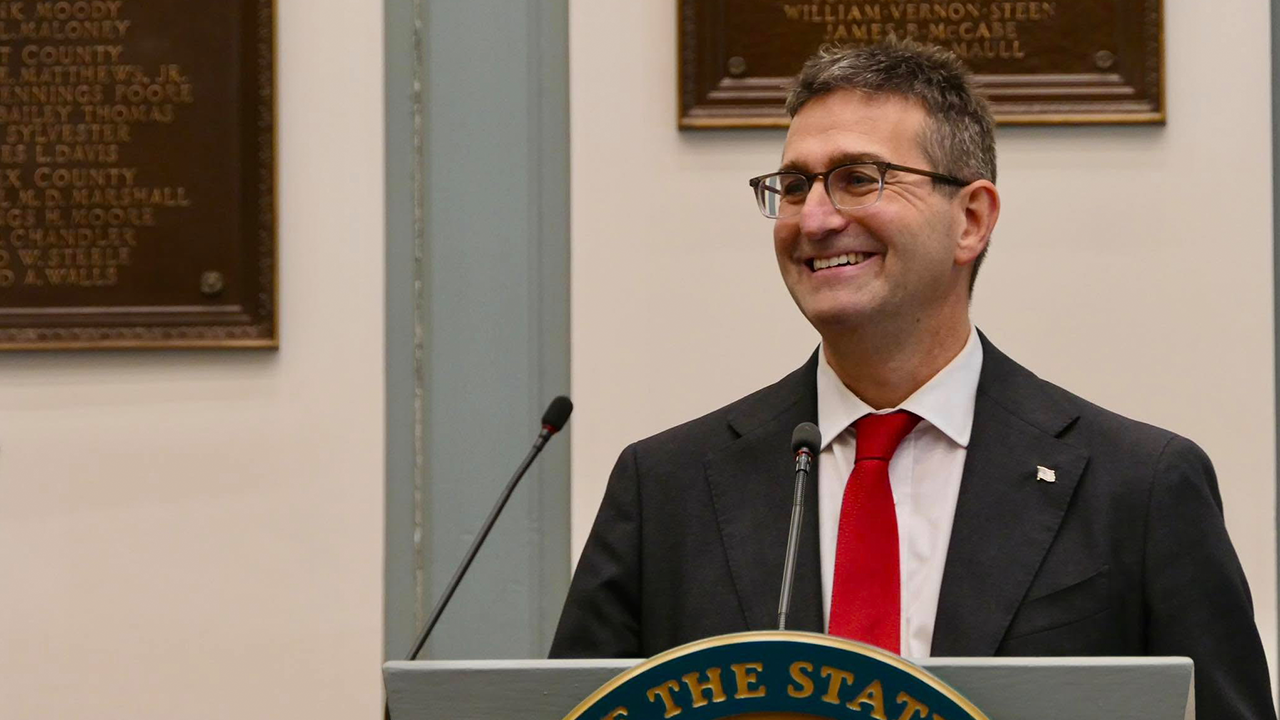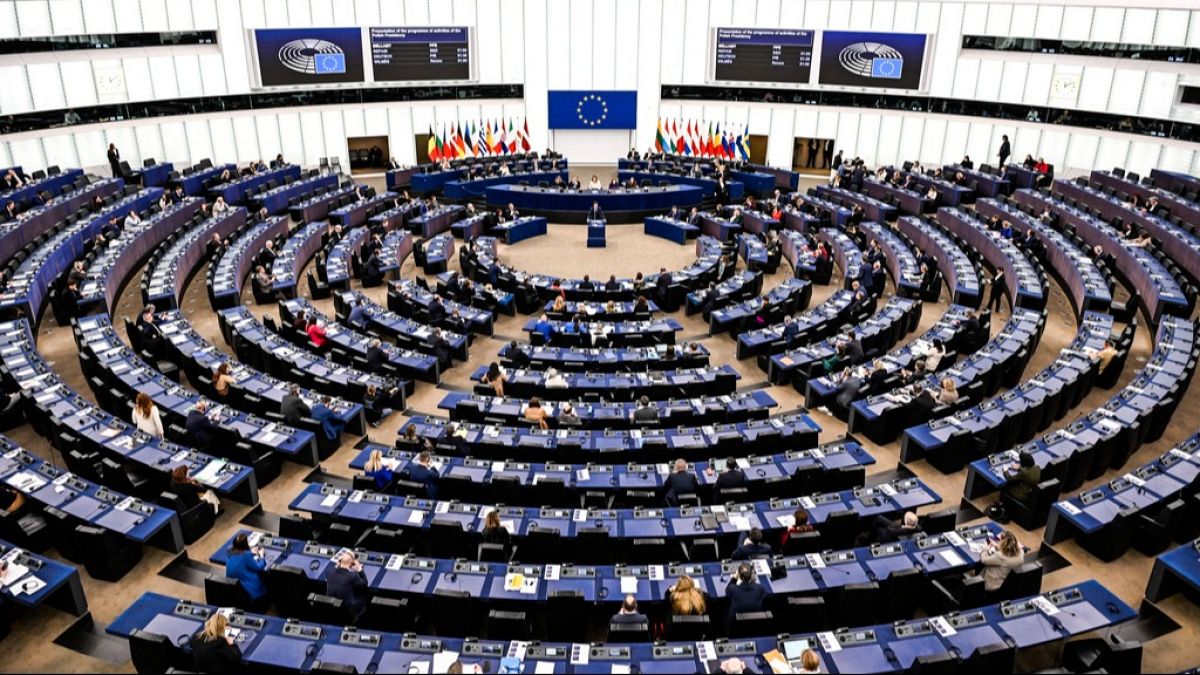New York
Paralyzed by a Police Bullet, He Describes a Life Forever Changed

The bullet, fired by a police officer who was sprinting into the 3 a.m. darkness, struck Khalif Cooper with improbable precision.
The projectile penetrated the young man’s lower back before ripping through organs and coming to rest near a vertebrae that controls lower-body movement. By morning, Mr. Cooper had lost a kidney, half his colon and his ability to ever walk again.
“My whole life just changed,” Mr. Cooper, who is 29 and Black, said in his first interview since the shooting.
It happened on a warm Saturday last June in Paterson, N.J., and Mr. Cooper, the father of two young daughters, said he was running away from the sound of gunfire.
A police officer, Jerry Moravek, came racing down the sidewalk toward the same noise. Their paths crossed, footage from a police body camera shows, and Officer Moravek pivoted to begin chasing Mr. Cooper, convinced that he was holding a gun.
Months later, Officer Moravek would be charged with aggravated assault for his decision to fire his weapon, without warning, toward a man who was running away. In March, the shooting would become one of the many data points used to justify the state attorney general’s decision to take the rare step of seizing control of the troubled Paterson Police Department.
But that is largely beside the point to Mr. Cooper. He worries most these days about his inability to help when his daughters cry and the mild humiliations that define his day-to-day existence. He cannot hoist himself out of his wheelchair into bed without help, and his girlfriend, who gave birth to their daughter a week after the shooting, now must change his diaper, too.
“There have been times when I just couldn’t take it, and I was, like, ‘I just want to die,’” he said.
Mr. Cooper had had past run-ins with the police, and he had been released from prison less than two years earlier after serving time for weapons and drug convictions. But he has not been accused of doing anything wrong the night he was shot. And a gun found about a block from where he fell held none of his DNA or fingerprints, court records show.
“Why did you run from me?” the officer asked Mr. Cooper after pulling his wrists into handcuffs, according to video released by prosecutors. “I was scared,” he answered.
Narcia Cooper, Khalif’s mother, spent nearly every day at her son’s bedside during the three months he was hospitalized. She still cannot make sense of why he was shot. “If someone is running away from you, why shoot them?” she asked.
Many police shooting victims’ names become rallying cries for reform upon death. As someone who survived, Mr. Cooper understands the power he now holds as a bleak, living reminder of America’s policing crisis.
“What I experienced — I don’t want nobody to ever go through this,” he said.
This week, Mr. Cooper filed a $50 million federal lawsuit against Officer Moravek, the City of Paterson and its former police chief and police director. He has dual goals: locking in enough money to pay for a lifetime of medical care and driving home a point.
“We pray that the good cops keep being good cops,” said Kenyatta Stewart, who grew up with Mr. Cooper in Paterson and is one of three lawyers representing him, “and the bad cops understand what can happen when you make these decisions.”
Officer Moravek remains on paid leave. Paterson’s mayor, André Sayegh, said the city does not comment on pending litigation. Officer Moravek’s lawyer, Patrick Caserta, could not be reached for comment, but he has said that his client made a split-second decision based on a belief that his life and the lives of people nearby were at imminent risk.
Isa M. Abbassi, a former New York Police Department chief who was instrumental in crafting the city’s strategy after the 2014 police killing of Eric Garner on Staten Island, has been in charge of the Paterson department since early May.
“We have already begun the process of providing supplemental training for our members in the areas of constitutional policing and use of force,” Mr. Abbassi said on his first day on the job.
“The next generation of public safety starts today,” he added, “and it starts in Paterson, New Jersey.”
With 157,000 residents, Paterson, which is about 20 miles northwest of New York City, is the state’s third-largest city.
It has its landmarks. Hinchliffe Stadium, one of the last Negro Leagues ballparks still standing, reopened in May behind the Great Falls, a hydropower behemoth that fueled the country’s Industrial Revolution. Over the past two decades, refugees from Afghanistan and Syria and elsewhere, eager to build new lives, have flooded the welcoming city.
But unlike Newark and Jersey City, the state’s two larger cities, which are closer to the shimmer of New York City and benefit more from its reflected glow, Paterson has struggled for economic traction.
Its schools, under state control for 30 years until 2021, were shut during the pandemic for longer than all but one other district in New Jersey. Last spring, 46 percent of the city’s third-graders scored at the lowest level on standardized reading tests, more than twice the statewide failure rate.
And of the 46 fatal encounters with New Jersey law enforcement officials since 2019, eight were in Paterson — more than any other community in the state, according to an analysis by NJ Spotlight News.
Every year in the United States, more than 80,000 people suffer nonfatal injuries during contact with law enforcement officials, according to a University of Illinois Chicago study of data collected by the Centers for Disease Control and Prevention. In 2018, the most recent year with all relevant figures available, 54 percent of those injured were Black, even though African Americans make up only about 14 percent of the country’s population.
Before the shooting, Mr. Cooper said he never felt particularly distrustful of the police. “I look at cops like they’re people, they do what they got to do,” said Mr. Cooper, whose uncle and cousin are both police officers in Paterson. “That’s their job.”
Dennis Hickerson-Breedon, one of Mr. Cooper’s lawyers, said it would be impossible to know what Officer Moravek was thinking when he pulled the trigger. Still, he said he believed that Mr. Cooper’s well-being “was much more expendable than a person who may live in a more suburban neighborhood.”
The lawsuit, filed in U.S. District Court in New Jersey, argues that Officer Moravek fired his weapon on June 11, 2022, “without need, justification or cause,” in violation of Mr. Cooper’s civil rights.
In spring of 2022, Mr. Cooper had moved with his girlfriend, Kaelah Pace, to Sugar Notch, Pa., about two hours west of Paterson by car, and had been preparing to start work at a pet food supply company, the couple said. His lawyers said he was in Paterson the weekend of the shooting to see his older daughter, who is 6.
Police body camera video from that night shows about a dozen people milling around outdoors. Officer Moravek pulls up in a police car at about 3:15 a.m. and explains to them that several neighbors had called to complain. Then, over the radio, another officer reports having a suspect with a gun in custody. Seconds later, three shots ring out, and Officer Moravek begins running toward the noise, encountering Mr. Cooper along the way.
“Drop the gun,” he shouts several times, but never orders Mr. Cooper to stop or warns that he is about to shoot — omissions the attorney general said were violations of the state’s use-of-force policy when he charged Officer Moravek with assault and official misconduct.
The bullet has never been removed from Mr. Cooper’s back. For now, he said, it is safer to leave it untouched.
Ms. Pace, a certified nursing assistant who also has a 5- and a 7-year-old, is his main caregiver, but physical therapists and nurses visit regularly. Wound care, managing a diet that is easy on his remaining kidney and the strain involved in lifting Mr. Cooper in and out of the wheelchair are constant struggles.
“It’s just a lot,” Ms. Pace, 23, said before starting to cry, awakening their 1-year-old daughter, who began to fuss.
Mr. Cooper reached out and placed her on his lap in the wheelchair, and the baby smiled.
“She thinks it’s a ride,” he said.
Mr. Cooper said he missed the small things most: walking to the park; being able to swim with his daughters; the dream of eventually having another child.
“I wish I could go back. I wish I could go back in time,” he said.
“But I’ve got to keep going for my kids — you know? — for my daughters.
“They give me life.”

New York
Video: How a Mexican Navy Ship Crashed Into the Brooklyn Bridge

On Saturday, a Mexican Navy ship on a good will tour left a New York City pier bound for Iceland. Four minutes later, it crashed into the Brooklyn Bridge. [Spanish] “It’s falling!” [English] “No way!” Here’s what happened. The Cuauhtémoc had been docked on the Lower East Side of Manhattan for four days, open to visitors looking for a cultural experience. As the ship prepared to leave on Saturday night, a tugboat arrived to escort it out of its pier at 8:20 p.m. The ship’s bow, the front of the vessel, faced Manhattan, meaning it would need to back out of its berth into the East River. As the Cuauhtémoc pulled away from shore, the tugboat appeared to push the side of the ship, helping to pivot the bow south toward its intended route. The river was flowing northeast toward the Brooklyn Bridge and the wind was blowing in roughly the same direction, potentially pushing the ship toward a collision. Photos and videos suggest the tugboat was not tied to the ship, limiting its ability to pull the ship away from the bridge. The Cuauhtémoc began to drift north, back first, up the river. Dr. Salvatore Mercogliano, who’s an adjunct professor at the U.S. Merchant Marine Academy, told The Times that the ship appeared to be giving off a wake. This suggests its propellers may have been running in reverse, pushing it faster toward the bridge. The tugboat sped alongside the ship as it headed north, possibly trying to get in front of it and help the ship maneuver the other way. But it was unable to cut the ship off or reverse its course. All three masts crashed into the underside of the Brooklyn Bridge at approximately 8:24 p.m., four minutes after the ship had left the pier, causing the top sails to collapse. Crew members standing on the masts during the collision were thrown off entirely. Others remained hanging from their harnesses. A New York City patrol boat arrived about eight minutes after the collision, followed quickly by a fire department boat. Additional law enforcement and emergency medical services removed the wounded for treatment. According to the Mexican Navy, two of the 227 people aboard the ship were killed and 22 others were injured.
New York
Audio Data Shows Newark Outage Problems Persisted Longer Than Officials Said

On April 28, controllers at a Philadelphia facility managing air traffic for Newark Liberty International Airport and smaller regional airports in New Jersey suddenly lost radar and radio contact with planes in one of the busiest airspaces in the country.
On Monday, two weeks after the episode, Sean Duffy, the secretary of transportation, said that the radio returned “almost immediately,” while the radar took up to 90 seconds before it was operational.
A Times analysis of flight traffic data and air traffic control feed, however, reveals that controllers were struggling with communication issues for several minutes after transmissions first blacked out.
The episode resulted in multiple air traffic controllers requesting trauma leave, triggering severe flight delays at Newark that have continued for more than two weeks.
Several exchanges between pilots and controllers show how the outage played out.
Outage Begins
Air traffic recordings show that controllers at the Philadelphia facility first lost radio and radar communications for about a minute starting just before 1:27 p.m., after a controller called out to United Flight 1951, inbound from Phoenix.
The pilot of United 1951 replied to the controller’s call, but there was no answer for over a minute.
1:26:41 PM
Controller
OK, United 1951.
1:26:45 PM
Pilot
Go ahead.
1:27:18 PM
Pilot
Do you hear us?
1:27:51 PM
Controller
How do you hear me?
1:27:53 PM
Pilot
I got you loud and clear now.
Two other planes reached out during the same period as United 1951 — a Boeing 777 inbound from Austria and headed to Newark, and a plane whose pilot called out to a controller, “Approach, are you there?” Their calls went unanswered as well.
Radio Resumes, With Unreliable Radar
From 1:27 to 1:28 p.m., radio communications between pilots and controllers resumed. But soon after, a controller was heard telling multiple aircraft about an ongoing radar outage that was preventing controllers from seeing aircraft on their radarscopes.
One of the planes affected by the radar issues was United Flight 674, a commercial passenger jet headed from Charleston to Newark.
1:27:32 PM
Pilot
United 674, approach.
1:27:36 PM
Controller
Radar contact lost, we lost our radar.
1:30:34 PM
Controller
Turn left 30 degrees.
1:31:03 PM
Pilot
All right, we’re on a heading of 356. …
1:31:44 PM
Controller
I see the turn. I think our radar might be a couple seconds behind.
Once the radio started operating again, some controllers switched from directing flights along their planned paths to instead providing contingency flight instructions.
At 1:28 p.m., the pilot of Flight N16NF, a high-end private jet, was called by a controller who said, “radar contact lost.” The pilot was then told to contact a different controller on another radio frequency.
About two and a half minutes later, the new controller, whose radar did appear to be functioning, instructed the pilot to steer towards a location that would be clear of other aircraft in case the radio communications dropped again.
Flight N426CB, a small private jet flying from Florida to New Jersey, was told to call a different radio frequency at Essex County Airport, known as Caldwell Airport, in northern New Jersey for navigational aid. That was in case the controllers in Philadelphia lost radio communications again.
1:27:57 PM
Controller
If for whatever reason, you don’t hear anything from me further, you can expect to enter right downwind and call Caldwell Tower.
1:29:19 PM
Controller
You just continue on towards the field. They’re going to help navigate you in.
This is in case we are losing our frequencies.
1:29:32 PM
Pilot
OK, I’m going over to Caldwell. Talk to you. Have a good afternoon.
Minutes Later, Radar Issues Persist
According to the Federal Aviation Administration, aircraft reappeared on radarscopes within 90 seconds of the outage’s start, but analysis of air traffic control recordings suggest that the radar remained unreliable for at least some radio frequencies for several minutes after the outage began around 1:27 p.m.
At 1:32 p.m., six minutes after the radio went quiet, Flight N824TP, a small private plane, contacted the controller to request clearance to enter “Class B” airspace — the type around the busiest airports in the country. The request was denied, and the pilot was asked to contact a different radio frequency.
1:32:43 PM
Pilot
Do I have Bravo clearance?
1:32:48 PM
Controller
You do not have a Bravo clearance. We lost our radar, and it’s not working correctly. …
If you want a Bravo clearance, you can just call the tower when you get closer.
1:32:59 PM
Pilot
I’ll wait for that frequency from you, OK?
1:33:03 PM
Controller
Look up the tower frequencies, and we don’t have a radar, so I don’t know where you are.
The last flight to land at Newark was at 1:44 p.m., but about half an hour after the outage began, a controller was still reporting communication problems.
“You’ll have to do that on your own navigation. Our radar and radios are unreliable at the moment,” a Philadelphia controller said to a small aircraft flying from Long Island around 1:54 p.m.
Since April 28, there has been an additional radar outage on May 9, which the F.A.A. also characterized as lasting about 90 seconds. Secretary Duffy has proposed a plan to modernize equipment in the coming months, but the shortage of trained staff members is likely to persist into next year.
New York
Two Men’s Fight to Protect the Geese at the Central Park Reservoir

Whether goslings live or die at the Central Park Reservoir could be up to two 70-something, nature-loving men who first crossed paths there this winter.
Edward Dorson, a wildlife photographer and regular visitor to the reservoir, learned in 2021 that federal workers were destroying the eggs of Canada geese there as part of a government safety program to decrease bird collisions with airplanes. He tried to stop it.
He reached out to animal rights organizations and wrote letters to various government agencies. He got nowhere.
Then in December, he met Larry Schnapf, a tough-talking environmental lawyer, who spotted Mr. Dorson admiring the birds and introduced himself. Mr. Dorson told him about the nest destruction. Mr. Schnapf, in his 40-year legal career, had mostly focused on redeveloping contaminated properties but had picked up the occasional pro bono passion project. “I told him I take on quixotic pursuits,” Mr. Schnapf said.
Now, they are teaming up to protect the eggs of a small population of Canada geese that nest around the reservoir, a popular attraction for joggers and bird watchers. The battle will undoubtedly be uphill: They are lobbying multiple government agencies during a fraught time in aviation where bird strikes are one of many concerns, on behalf of a bird often described as a nuisance because of its honking cries and the droppings it leaves on lawns, parks and golf courses.
The men say they appreciate the importance of protecting planes. But they are seeking to exempt the Central Park Reservoir from the egg destruction program so that it can serve as a sanctuary for the nesting geese. They argue that Central Park is far enough from the area’s airports that the geese do not pose a major problem.
Mr. Schnapf said he plans to send a cease-and-desist letter to the Port Authority of New York and New Jersey, which oversees five major airports in the region, including Kennedy International Airport, Newark Liberty International Airport and LaGuardia Airport. The agency works with an arm of the U.S. Department of Agriculture on the safety program. “I think this is all unlawful,” he said. “These are protected animals.”
Port Authority officials did not comment on the advocacy plans of the two men. But they stressed that government efforts like those underway in Central Park were part of creating safer conditions for air travel.
“Managing wildlife risks — especially from resident Canada geese — near our airports is a life safety imperative and essential to maintaining safe operations,” said Laura Francoeur, the Port Authority’s chief wildlife biologist.
Although Canada geese are protected under the Migratory Bird Treaty Act, authorities have obtained a waiver to control the population. The birds, which can weigh as much as 19 pounds and have a wingspan up to 5.5 feet, according to the Cornell Lab of Ornithology, can get sucked into plane engines and bring an aircraft down.
Between 2008 and 2023, there were 451 aviation accidents involving commercial aircraft in the United States, with a total of 17 caused by bird strikes, producing five injuries and no fatalities, according to the National Transportation Safety Board.
New York City tightened its grip on Canada geese in 2009, after a collision with a flock caused US Airways Flight 1549, piloted by Chesley B. Sullenberger III, to lose both its engines shortly after it took off from LaGuardia. The plane was forced into an emergency water landing in what is now commonly known as the “miracle on the Hudson.”
The event prompted the Port Authority to ask the Department of Agriculture for help. In 2010, federal wildlife workers took on the management of Canada geese populations within seven miles of the city’s major airports, including in city parks.
Mr. Schnapf calls the current rules an overreach, since Federal Aviation Administration guidelines call for wildlife management only within five miles of airports. A Port Authority spokeswoman said the agency honors all federal regulations, including addressing wildlife hazards within five miles of airports. But she added that the agency will often go beyond that radius when specific threats arise.
Data from the F.A.A. shows that Canada geese strikes at LaGuardia and Kennedy Airports have remained consistent over the last two decades, with between zero and four instances per year.
Canada geese thrive in people-friendly landscapes, and their population has boomed throughout North America over the last four decades. Many geese have become so comfortable in parks and other green spaces, like the reservoir, that they have stopped migrating, becoming year-round residents.
There are about 228,000 resident Canada geese in New York State, up from 150,000 in 2002. The state’s Department of Environmental Conservation would like to see that number shrink to 85,000.
The two men fighting for the Central Park Reservoir’s resident geese were both born in the Bronx, are similar in age and diet (one is a vegetarian, the other a vegan). But the similarities more or less end there.
Mr. Dorson, 77, an accomplished underwater photographer and conservationist with a background in the arts, is a soft-spoken lover of hard-to-love animals — he helped start a shark sanctuary in Palau, in Micronesia. Mr. Schnapf, 72, is a fast-talking, fast-acting networker who is not afraid to make noise.
“I told Ed,” he said, “you’ve got to rattle the bureaucracy.”
Mr. Dorson and Mr. Schnapf are hoping to meet with officials from the Port Authority, the Central Park Conservancy and the city’s Department of Environmental Protection, which oversees the reservoir, among other decision makers.
”All we’re trying to do is get them to talk to us, so we can come up with a plan so at least some of those eggs can be hatched,” Mr. Schnapf said.
Mr. Dorson admitted that, right now, “I don’t see too many people like me who are worried about the geese.”
“But maybe 10 years from now, when there are no geese here, then people might feel the loss,” he said. “I’d like to change that.”
-

 Technology1 week ago
Technology1 week agoMexico is suing Google over how it’s labeling the Gulf of Mexico
-

 Politics1 week ago
Politics1 week agoDHS says Massachusetts city council member 'incited chaos' as ICE arrested 'violent criminal alien'
-

 Education1 week ago
Education1 week agoA Professor’s Final Gift to Her Students: Her Life Savings
-

 Politics1 week ago
Politics1 week agoPresident Trump takes on 'Big Pharma' by signing executive order to lower drug prices
-

 Education1 week ago
Education1 week agoVideo: Tufts Student Speaks Publicly After Release From Immigration Detention
-

 News7 days ago
News7 days agoAs Harvard Battles Trump, Its President Will Take a 25% Pay Cut
-

 Culture1 week ago
Culture1 week agoTest Yourself on Memorable Lines From Popular Novels
-

 News1 week ago
News1 week agoWhy Trump Suddenly Declared Victory Over the Houthi Militia














